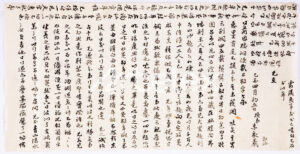Lee Sang-ryong (November 24, 1858 – June 15, 1932) was a prominent independence activist, and his entire family dedicated themselves to the independence movement.
Translation:
Previously, I sent a few lines of a letter through Gyo-dong, but since there has been no reply to the letter you mentioned, I assume you may not have received it. To briefly summarize what I conveyed, it has been four or five years since we parted ways and haven’t met. My beard has already grown several inches, and if we meet again and fail to recognize each other, leading to doubt, I suppose we will need to prove our identities with nothing but sincerity. However, it is my regret that this sincerity, hidden within my heart, cannot be split open and revealed to others.
You also mentioned having encountered many virtuous and upright people in the world. Yet, those who only pursue benefit are like grains of sand, those who chase after fame are like pebbles, and those who preserve their lives with honor shine like the bright moon at night, and only one or two among a thousand may achieve this. You, my brother, possess talents and insight, and the path ahead of you is already well-defined. Being both wise and true, how could you fail to attain great accomplishments? However, though you are still in your twenties and your spirit is sharp, I fear that even steel may not withstand numerous arrowheads.
As for my situation, my worry and tears stem from the illness of my parents. Moreover, an epidemic is spreading in the countryside, and my child is suffering from smallpox, which has added to my countless anxieties. My heart feels as heavy as rice grains. Yesterday, I was able to eat with some peace, but today, I am weighed down by what must be repaid. Ultimately, what was once tomorrow becomes yesterday, and in this way, the years have passed. I fear that half of my life will be spent in this manner, marked by such stains. Just like rice stems, which turn white as they mature, I too will grow old. Time passes in the blink of an eye, and how could this not be sorrowful?
In closing, I must say that my recent trip to Cheonsang was not solely to congratulate Su-ong. I have failed to keep my promises nearly 19 times, and if you knew that I was coming but chose not to meet, it will be difficult for us to walk the same path in the future. Have my thoughts of you become an incurable ailment? Everything I say comes from the heart. If I meet you again, I do not know how I will react.
As for Neolyeon, it seems difficult to decide how he plans to spend the summer. Like me, he enjoys the natural beauty of mountains and rivers, and if we could spend just one day leisurely indulging in the pleasures of life, it would truly be a blessing. What words are there for several months of such days? My desire to join you is great, yet it pains me that I cannot. However, in five or six days, I may be going to Gilhyeop to seek medicine, and if I find time, I will certainly visit my dear brother, as radiant as the blue mountains and green waters.
The events of last autumn were such that the situation could not be remedied. Whether helping or criticizing, stones can be polished and gold can be melted. But one must leave it to fate and not interfere. You have, once again, excelled and established yourself independently. Is it, as they say, that you hide your words only to listen? This makes me deeply ashamed in front of both of us.
When you were an official of the local Confucian academy, you inscribed the title “轟然可當” in four characters on a single piece of writing, which was a reflection of your biased approach. The statement in your last letter, ‘small steel cannot easily deflect many arrowheads,’ was an insightful observation. Have you thought deeply about this issue? I had many thoughts, like mountains and oceans, but in my haste, I omitted much. I leave the rest to your judgment. As for the mourning of Hage’s passing, I conveyed my condolences in my previous letter, so I will not mention it here.
5th day of the 4th month, Eul-yu Year,
Your humble younger brother, Lee Sang-hui

